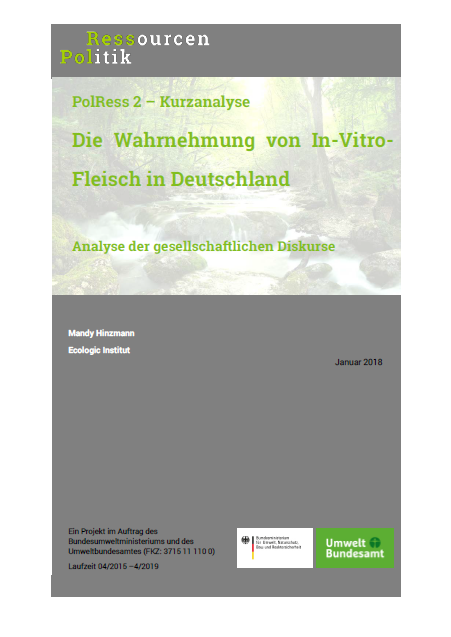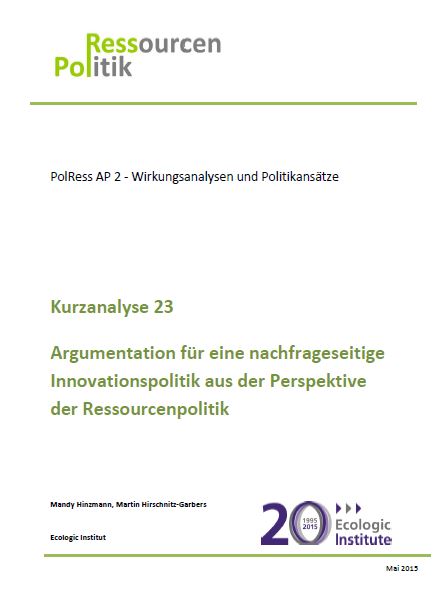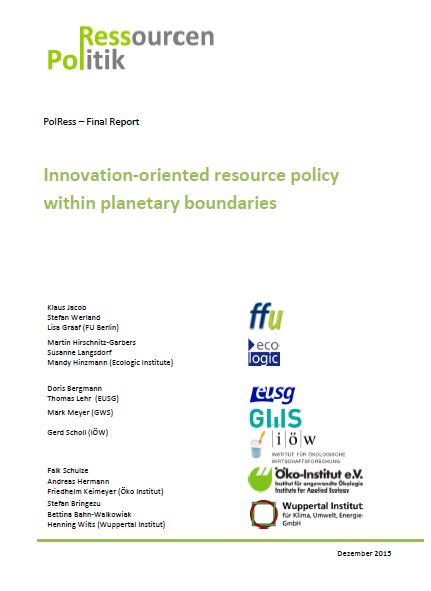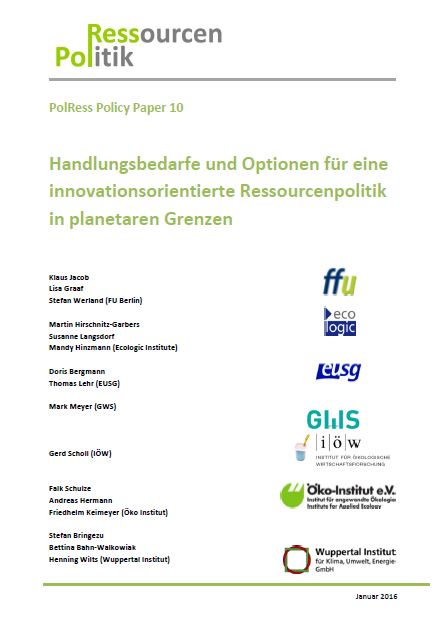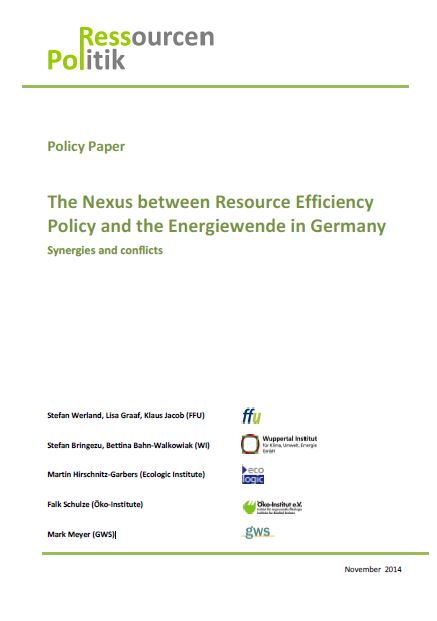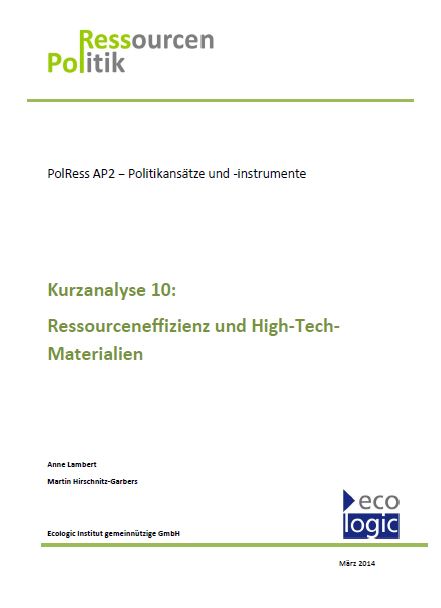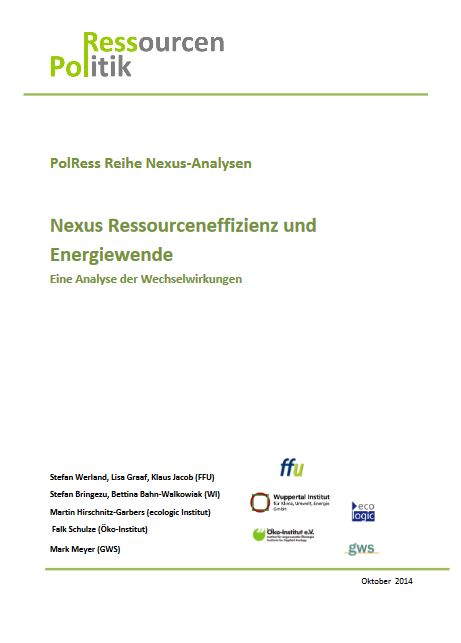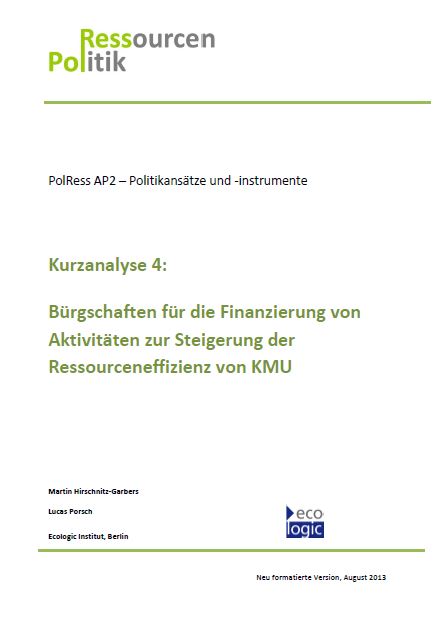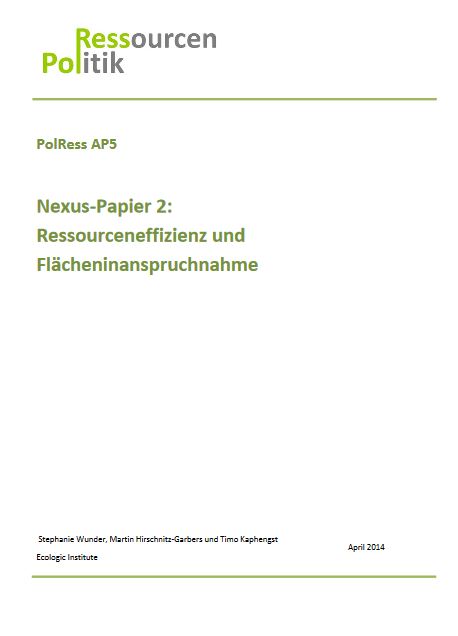In order to enhance resource efficiency nationally and internationally the emerging political and societal debate needs to be analysed and fostered. The project aims to scientifically analyse this debate, to support it and to contribute impulses. To this end, inter alia policy options will be assessed and impulses to the debate will be developed.
Germany has dedicated itself to a sophisticated resource policy - not least with its recently adopted national programme on resource efficiency (ProgRess). Furthermore, the National Sustainability Strategy calls for a doubling of resource productivity by 2020 compared to 1994.
Increasing resource efficiency is necessary because natural resources are finite and their extraction and use are often associated with environmental impacts. Existing monitoring reports suggest that achieving the goal of doubling resource productivity will require substantial additional efforts. Here, further potentials must be exploited and politics must contribute to overcome existing barriers. However, within the political and societal debate there is contention around the concrete objectives and priorities, aspirations and the instruments best to be employed.
In order to effectively contribute, the project will systematically analyse the debate on objectives and indicators. Based thereupon, different options for selection, operationalisation and prioritisation of objectives of resource policy will be elaborated. For these policy options, an impact assessment will then be conducted. Furthermore, quantitative simulations and qualitative scenarios will be developed, as well as scientifically based impulses to the debate be compiled.
Ecologic Institut will contribute to discussing objectives and indicators, will analyse policy options and will develop and assist impulses for the debate.
- Funding
-
German Environment Agency (UBA), Germany - Partner
-
Freie Universität Berlin (FU Berlin), Germany Ecologic Institute, Germany Wuppertal Institute for Climate, Environment and Energy (Wuppertal Institute), Germany Gesellschaft für Wirtschaftliche Strukturforschung (GWS), Germany Institute for Ecological Economy Research (IÖW), Germany Oeko-Institut (Öko-Institut e.V.), Germany Parmenides Foundation, European School of Governance (EUSG), Germany - Team
-
Dr. Martin Hirschnitz-GarbersLucas Porsch
- Duration
-
-
- Project ID
- Keywords
-
resource efficiency, policies, political and societal debate, impact assessmentGermany, Europe
Jacob, Klaus; Martin Hirschnitz-Garbers; Katrin Bienge et. al. 2014: Strategien und Optionen zur Stärkung der Ressourcenpolitik im Rahmen einer Green Economy. Input-Papier des PolRess-Konsortiums für das Parlamentarische Frühstück, 6. Juni 2014.
Bienge, Katrin; Martin Hirschnitz-Garbers; Klaus Jacob et al. 2013: Schlüsselfragen der Ressourcenpolitik in der kommenden Legislaturperiode: Ein Zwischenruf aus der Wissenschaft.
Discussion:Parliamentary Breakfast "Key Questions of German Resource Policy in the Next Legislative Period"
- Date
-
- Location
- Berlin, Germany
Chairing:Experts discuss next steps in German resource policy - Parliamentary Breakfast focusing on Resource Policy
- Date
-
- Location
- Berlin, Germany
Jacob, Klaus et al. (2016): Handlungsbedarfe und Optionen für eine innovationsorientierte Ressourcenpolitik in planetaren Grenzen. PolRess Policy Papier.
Jacob, K. et. al. (2015): An innovation-oriented resource policy within planetary boundaries. Final Report of the research project PolRess-Resource Policy. www.ressourcenpolitik.de
Hinzmann, M. und Hirschnitz-Garbers, M. (2015): Argumentation für nachfrageseitige Innovationspolitik aus der Perspektive der Ressourcenpolitik. Kurzanalyse 23 im Projekt Ressourcenpolitik: Analyse der ressourcenpolitischen Debatte und Entwicklung von Politikoptionen (PolRess).
Hirschnitz-Garbers, M. / Porsch, L. (2013): Bürgschaften für die Finanzierung von Aktivitäten zur Steigerung der Ressourceneffizienz von KMU. Kurzanalyse 4 im Projekt Ressourcenpolitik: Analyse der ressourcenpolitischen Debatte und Entwicklung von Politikoptionen (PolRess). www.ressourcenpolitik.de
Werland, S. (2014): The Nexus between Resource Efficiency Policy and the Energiewende in Germany. Synergies and conflicts. Policy Paper im Projekt Ressourcenpolitik: Analyse der ressourcenpolitischen Debatte und Entwicklung von Politikoptionen (PolRess). www.ressourcenpolitik.de
Wunder, Stephanie; Martin Hirschnitz-Garbers; Timo Kaphengst 2014: Ressourceneffizienz und Flächeninanspruchnahme. Nexus-Papier 2 im Projekt Ressourcenpolitik: Analyse der ressourcenpolitischen Debatte und Entwicklung von Politikoptionen (PolRess). www.ressourcenpolitik.de
Lambert, A./Hirschnitz-Garbers, M. (2014): Ressourceneffizienz und High-Tech-Materialien. Kurzanalyse 10 im Projekt Ressourcenpolitik: Analyse der ressourcenpolitischen Debatte und Entwicklung von Politikoptionen (PolRess). www.ressourcenpolitik.de
Lambert, A. / Hirschnitz-Garbers, M. / Wilts, H. / v. Gries, N. (2014): Politikinstrumente zur Umsetzung von Rücknahmesystemen im Bereich Elektrogeräte. Kurzanalyse AP2 im Projekt Ressourcenpolitik: Analyse der ressourcenpolitischen Debatte und Entwicklung von Politikoptionen (PolRess).
Werland, Stefan, Graaf, Lisa, Jacob, Klaus et al. (2014): Nexus Ressourceneffizienz und Energiewende. Eine Analyse der Wechselwirkungen. Berlin. www.ressourcenpolitik.de
Hirschnitz-Garbers, M. und Langsdorf, S. (2015): Informationskampagnen für Konsumentinnen und Konsumenten – Effekte und Ausrichtungen. Vertiefungsanalyse 4 im Projekt Ressourcenpolitik: Analyse der ressourcenpolitischen Debatte und Entwicklung von Politikoptionen (PolRess). www.ressourcenpolitik.de




